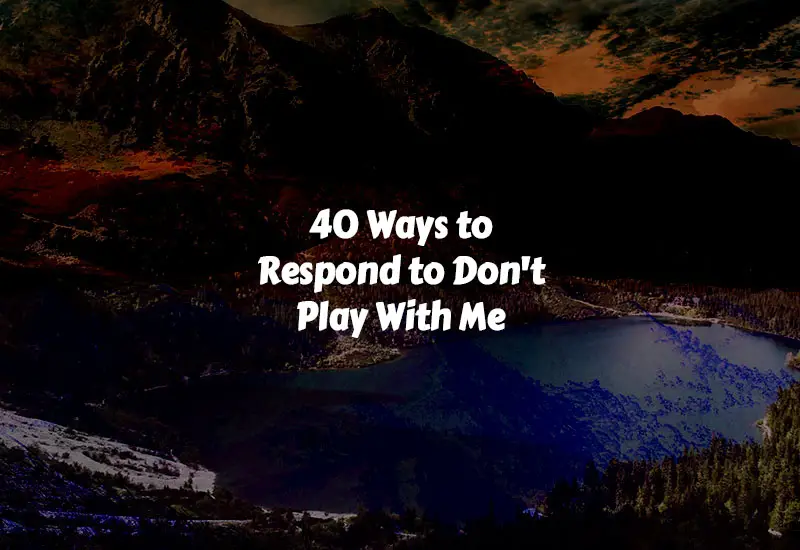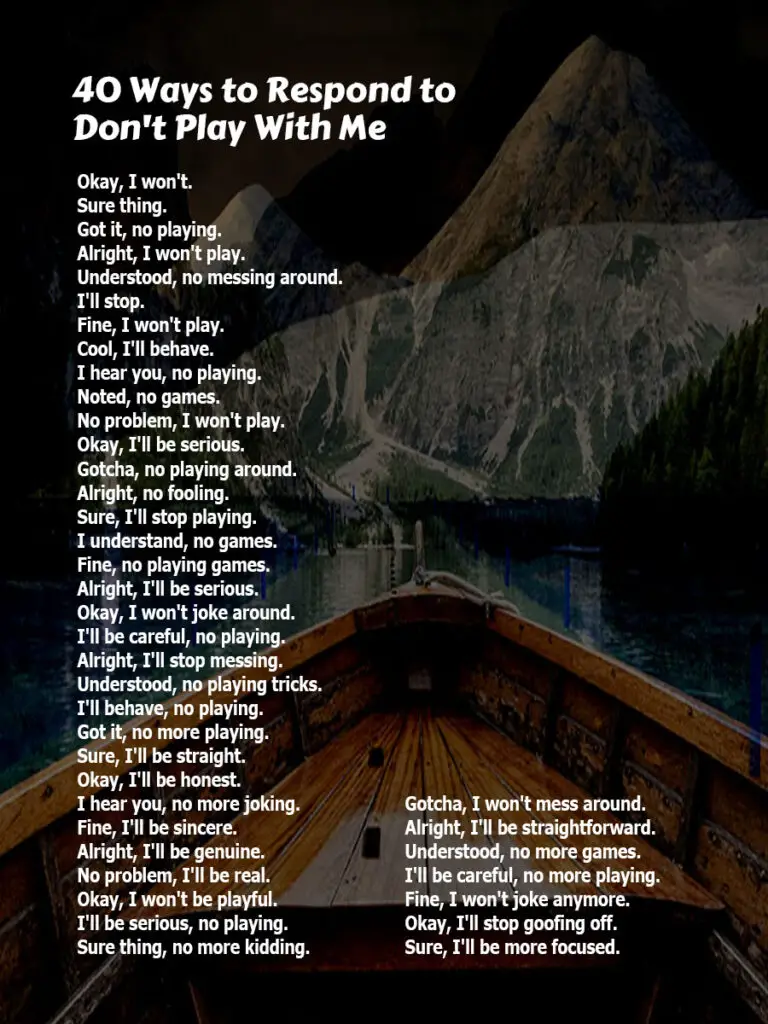Have you ever been told, “Don’t play with me”? It’s like someone is serious and wants you to stop goofing around. But don’t worry, I’ve got you covered! In this blog post, we’re going to explore some easy ways to respond when someone says, “Don’t play with me.” From simple nods to promising to be serious, we’ll cover 40 different responses that you can use in different situations. So whether you’re with friends, family, or even at work, you’ll know just what to say when someone wants you to stop playing around.

Here are 40 Ways to Respond to Don’t Play With Me:
- Okay, I won’t.
- Sure thing.
- Got it, no playing.
- Alright, I won’t play.
- Understood, no messing around.
- I’ll stop.
- Fine, I won’t play.
- Cool, I’ll behave.
- I hear you, no playing.
- Noted, no games.
- No problem, I won’t play.
- Okay, I’ll be serious.
- Gotcha, no playing around.
- Alright, no fooling.
- Sure, I’ll stop playing.
- I understand, no games.
- Fine, no playing games.
- Alright, I’ll be serious.
- Okay, I won’t joke around.
- I’ll be careful, no playing.
- Alright, I’ll stop messing.
- Understood, no playing tricks.
- I’ll behave, no playing.
- Got it, no more playing.
- Sure, I’ll be straight.
- Okay, I’ll be honest.
- I hear you, no more joking.
- Fine, I’ll be sincere.
- Alright, I’ll be genuine.
- No problem, I’ll be real.
- Okay, I won’t be playful.
- I’ll be serious, no playing.
- Sure thing, no more kidding.
- Gotcha, I won’t mess around.
- Alright, I’ll be straightforward.
- Understood, no more games.
- I’ll be careful, no more playing.
- Fine, I won’t joke anymore.
- Okay, I’ll stop goofing off.
- Sure, I’ll be more focused.
See Also: 28 Outstanding Ways to Respond to “Happy New Year”
Understanding Different Responses
Explore how people react to ‘Don’t Play With Me’ with varied responses, from setting boundaries assertively to calmly addressing concerns. Understanding different reactions can lead to better communication and respect in relationships.
Reflecting on Emotions
When facing a “Don’t play with me” scenario, it’s important to acknowledge your emotions such as frustration or hurt.
Setting Boundaries
Establishing clear boundaries is vital. Communicate your limits firmly and respectfully to assert your needs.
Reflecting on Emotions
Consider journaling or talking to a friend to process your feelings in a healthy way.
Setting Boundaries
Create a safe space for yourself by clearly stating what you will and will not tolerate.
Reflecting on Emotions
Be kind to yourself and understand that it’s okay to feel upset or disrespected.
Setting Boundaries
Empower yourself by enforcing consequences if your boundaries are not respected.
Reflecting on Emotions
Practice self-care techniques such as deep breathing or meditation to calm your emotions.
Setting Boundaries
Remember, setting boundaries is an act of self-respect and self-care.
See Also: 23 Cool Ways to Respond to Interview Questions
Effective Communication Strategies
Effective communication strategies are essential for addressing the situation when someone says ‘Don’t play with me.’ Using the right communication techniques can help resolve conflicts and misunderstandings, and improve relationships. Here are some strategies that can be effective:
Using ‘i’ Statements
When you hear “Don’t play with me,” responding with ‘I’ statements can help express your feelings without placing blame. For example, instead of saying “You’re always disrespectful,” try “I feel disrespected when you ignore my requests.” This approach encourages empathy and understanding while avoiding defensive reactions.
Active Listening Techniques
Active listening is a valuable skill when addressing the “Don’t play with me” situation. It involves fully concentrating, understanding, responding, and then remembering what is being said. To practice active listening, refrain from interrupting, provide feedback to ensure understanding, and show empathy towards the speaker’s feelings. This helps in creating an atmosphere of trust and understanding.
Self-care Practices
When someone tells you “Don’t play with me,” it’s important to prioritize your own well-being. Self-care practices can help you navigate difficult situations like this, empowering you to respond in a healthy and constructive manner. Here are two ways you can take care of yourself when faced with this kind of statement:
Emotional Regulation Techniques
Managing your emotions is key to responding effectively to someone who tells you not to play with them. Breathe deeply and acknowledge your feelings without judgment. Identify the specific emotions you’re experiencing, whether it’s frustration, annoyance, or hurt.
Once you’ve recognized these emotions, use positive self-talk to remind yourself that you have the capacity to control your reactions. Take a moment to reflect on what is triggering your emotions and consider how you can respond in a calm and composed manner. This self-awareness and emotional regulation can help prevent any unnecessary escalation of the situation.
Seeking Support
Seeking support is an essential part of taking care of yourself when faced with the statement “Don’t play with me.” Reach out to trusted friends or family members who can offer guidance, empathy, and a fresh perspective. Discussing the situation with them can help you gain clarity and allow you to approach the issue from a more balanced standpoint.
If necessary, consider professional support such as talking to a therapist or counselor who can provide you with valuable coping strategies and help you navigate the complexities of the situation. Remember that you don’t have to face this challenge alone; seeking support is an act of strength and self-care.
Setting Personal Limits
When it comes to relationships, it’s crucial to set personal limits and communicate them effectively. This not only helps maintain your self-respect but also ensures a healthy and balanced dynamic with others. Identifying deal breakers and maintaining self-respect are two key aspects of setting personal limits that can empower you in any situation.
Identifying Deal Breakers
Before entering any relationship, whether it’s romantic, platonic, or professional, it’s essential to identify your deal breakers. These are the boundaries that you refuse to compromise on, the actions or behaviors that are non-negotiable for you. By clearly defining your deal breakers, you set the foundation for a healthy relationship based on respect and mutual understanding.
Here are a few steps to help you identify your deal breakers:
- Reflect on your values and priorities: Consider what truly matters to you in a relationship and what you cannot tolerate.
- Understand your triggers: Identify the actions or behaviors that trigger negative emotions or make you feel uncomfortable.
- Listen to your intuition: Trust your gut feelings when something doesn’t feel right, even if it’s difficult to pinpoint the exact reason.
- Learn from past experiences: Reflect on previous relationships where your boundaries were crossed and use those lessons to define your deal breakers.
By taking the time to identify your deal breakers, you empower yourself to make informed decisions and protect your well-being.
Maintaining Self-respect
In any relationship, whether personal or professional, it’s crucial to maintain self-respect. This means valuing yourself and your boundaries, and not allowing others to disrespect or manipulate you. When you respond to someone saying, “Don’t play with me,” it’s an opportunity to assert your self-respect and communicate your boundaries.
Here are a few ways to maintain self-respect in challenging situations:
- Be assertive: Clearly express your feelings and opinions, using “I” statements to avoid sounding accusatory.
- Set consequences: Make it clear that there will be consequences if your boundaries are not respected, such as distancing yourself or ending the relationship.
- Practice self-care: Take care of your physical, emotional, and mental well-being by engaging in activities that make you feel good.
- Surround yourself with supportive people: Build a network of people who respect and support your personal limits.
By maintaining self-respect and enforcing your boundaries, you create a strong foundation for healthy relationships and ensure that you are treated with the respect you deserve.
Seeking Professional Help
Seeking professional help can be a crucial step in dealing with the emotional and psychological impacts of the “Don’t play with me” situation. It’s important to address any underlying issues and develop healthy coping mechanisms with the guidance of trained professionals.
Therapy Options
Therapy provides a safe and confidential space to explore your emotions and develop effective coping strategies. Some therapy options for addressing the impacts of “Don’t play with me” may include:
- Cognitive-behavioral therapy (CBT) to address negative thought patterns and behaviors.
- Dialectical behavior therapy (DBT) to manage intense emotions and improve relationships.
- Eye movement desensitization and reprocessing (EMDR) for processing traumatic experiences.
Counseling Resources
Accessing counseling resources can provide valuable support and guidance. It’s important to consider seeking assistance from:
- Licensed therapists specializing in trauma or emotional distress.
- Support groups where you can connect with others who have similar experiences.

Conclusion
In a world where self-respect is paramount, the way we respond to “Don’t play with me” says a lot about our character. By setting boundaries and communicating assertively, we can maintain our integrity. Remember, your response should reflect your values and self-worth.
Stay true to yourself.









